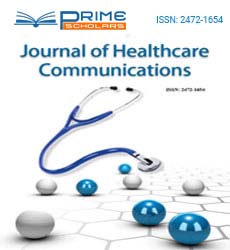Commentary Article - (2023) Volume 8, Issue 5
The Silent Strain: Unraveling the Impact of Excessive Medication on Human Organs
Jacob Tagg*
Department of Clinical Sciences, Lund University, Sweden
*Correspondence:
Jacob Tagg,
Department of Clinical Sciences, Lund University,
Sweden,
Email:
Received: 02-Oct-2023, Manuscript No. IPJHCC-23-18427;
Editor assigned: 04-Oct-2023, Pre QC No. IPJHCC-23-18427 (PQ);
Reviewed: 18-Oct-2023, QC No. IPJHCC-23-18427;
Revised: 23-Oct-2023, Manuscript No. IPJHCC-23-18427 (R);
Published:
30-Oct-2023, DOI: 10.36846/2472-1654-8.5.42
Description
In our modern quest for a quick fix to ailments, the prevalent
culture of overmedication has cast a shadow on the very organs
that medicines are intended to heal. The impact of using
excessive medicines on human organs is a nuanced and pressing
issue that demands our attention. While pharmaceutical
advancements have undeniably revolutionized healthcare,
the unintended consequences of over-reliance on medication
are becoming increasingly apparent. One of the primary
concerns surrounding the overuse of medicines is the strain it
places on the liver, the body’s chief detoxifying organ. Medications,
while designed to address specific health issues, often
introduce foreign substances into the bloodstream. The liver,
responsible for metabolizing these substances, can become
overwhelmed when bombarded with excessive doses of medication.
Over time, this may lead to liver damage, compromising
its vital functions and setting the stage for a cascade of health
issues. The kidneys, another vital organ, also bear the brunt
of excessive medication. Many drugs are excreted through
the urine, putting the kidneys under constant filtration stress.
Non-steroidal anti-inflammatory drugs (NSAIDs), often taken
for pain relief, are notorious for their potential to cause kidney
damage when used indiscriminately. The delicate balance
of electrolytes and fluid in the body can be disrupted, leading
to conditions such as kidney stones or even chronic kidney disease.
The cardiovascular system, while not the primary target
of many medications, is not immune to the consequences of
overmedication. Some drugs may elevate blood pressure or interfere
with the heart’s electrical signals, increasing the risk of
cardiovascular complications. Additionally, certain medications
may contribute to the development of atherosclerosis, the
hardening and narrowing of arteries, potentially culminating in
heart disease. The gastrointestinal tract, often disregarded in
discussions about overmedication, is significantly affected by
the indiscriminate use of certain drugs. Overuse of antibiotics,
for instance, can disrupt the balance of gut bacteria, leading
to conditions like antibiotic-associated diarrhoea. Similarly,
long-term use of acid-suppressing medications may interfere
with nutrient absorption, potentially giving rise to deficiencies
that further exacerbate health issues. The impact of excessive
medication extends beyond the physical realm, permeating
into the socio-economic fabric of healthcare. The economic
burden of treating medication-induced complications places
strain on healthcare systems already grappling with numerous
challenges. It prompts us to re-evaluate the prevailing paradigm
of symptom-centric medicine, emphasizing the importance
of preventive measures and a more holistic approach
to healthcare. To mitigate the impact of overmedication on
human organs, a paradigm shift is imperative. Healthcare professionals
must prioritize patient education, fostering a culture
of informed decision-making. Patients, in turn, should actively
engage with healthcare providers, seeking alternatives such as
lifestyle modifications or non-pharmacological interventions
where applicable. Furthermore, regulatory bodies need to
scrutinize the marketing and prescription practices of pharmaceutical
companies, ensuring that the benefits of medications
outweigh their potential risks. In conclusion, the impact of using
excessive medicines on human organs is a critical concern
that demands immediate attention. While medications play a
crucial role in treating various ailments, their overuse poses a
significant threat to the very organs they aim to protect. As we
navigate the complexities of modern healthcare, a balanced
and judicious approach to medication is essential to safeguard
the long-term health of individuals and alleviate the strain on
healthcare systems worldwide.
Acknowledgement
None.
Conflict Of Interest
The author declares there is no conflict of interest.
Citation: Tagg I (2023) The Silent Strain: Unraveling the Impact of Excessive Medication on Human Organs. J Healthc Commun. 8:42.
Copyright: © 2023 Tagg I. This is an open-access article distributed under the terms of the Creative Commons Attribution License, which permits unrestricted use, distribution, and reproduction in any medium, provided the original author and source are credited.

